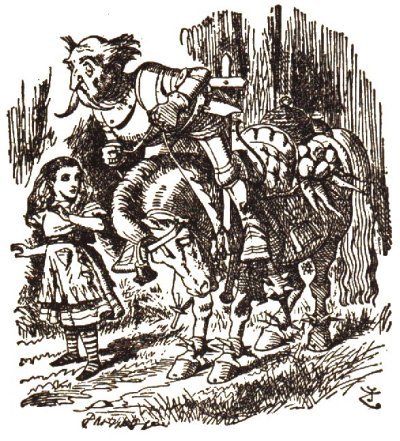|
Looking-Glass Logic
|
||
| The world is,
of course, going quietly and amiably mad. Lewis Carroll's way of thinking
will soon be the universal norm. Only this evening, I came across three
examples in a single news bulletin.
The first was a politician, doubtless the Honourable Member for Wonderland. The poor man had two bees in his bonnet. The first concerned the existence of a computer disk which apparently provides young people with recipes for explosives and instructions on how most efficiently to kill people. The Hon. Mem. was, reasonably enough, against this, and wanted a law preventing people from imparting such information. Secondly, the same man objected most strongly to the Government's programme of redundancies in the Armed Forces. At this time, he said, what with all the trouble in the world, we need more soldiers, not less. I thought this was splendid. Besides a tendency to question the suggestion that more soldiers equals less trouble (try that one out on your Iraqi friends and see what they think), I had a sudden glorious vision of the poor man getting his law against teaching people how to kill, and then standing open-mouthed in puzzlement as to what he was now going to do by way of training his extra soldiers. The second Lewis Carroll character was a Statesman, who had sent a strongly-worded protest to the Russians because they had been employing a traitor who had infiltrated the United States security services. Apparently, this was especially heinous because the mole in question had caused the capture of at least two Russian traitors who had infiltrated their own security services on behalf of the USA. Alice, while beyond the Looking-Glass, met the Red Queen (who never got anywhere unless she ran as fast as possible in the opposite direction), and, of course, the White Knight, who had a specially padded helmet to land on whenever he fell off his horse. The representative of Looking-Glass Land in tonight's news bulletin was the Purple Bishop. What the Bishop had to say, in essence, was that the Church of England had decided to ordain women priests (he called them priestesses), and that he was against this. As he refused to accept the authority of the Church in this matter, he had decided to shift his allegiance to another. And he had chosen the very one which most fervently insists on absolute obedience to the Authority of the Church. This, for me, raises two questions; why should his new Church accept him? And what happens when he expresses disagreement in the future? Now, all three of these people were suffering from the same problem; namely, that each had picked up a sensible and logical idea which was incompatible with his prejudices, but had not noticed the fact. The politician had decided that teaching young people how to kill was wrong, but had never considered that the Government, for its own purposes, does precisely and formally that, all the time. The Statesman considered traitors to be a bad thing, which may well be the case; but it never occurred to him that Russians working for the USA were also traitors, and of exactly the same type. His prejudice taught him that this sort of thing is only wrong when somebody else does it. |

As for the Bishop, alas, he had let a prejudice entirely overwhelm him. If he believes (as he has to, or they wont let him in) everything the Roman Catholic Church teaches, why didn't he join it forty years ago? If he doesn't, is he really prepared to swallow it all at one gulp, now, simply because it happens not to include female priests? It's time we started to extol the virtues of logic; simple, connected thought linking Cause with Effect. If this is wrong, that cannot be right. If I believe this, then I cannot support that. Jesus thought logically. That's why so often he came out with paradoxes; sayings which seem contradictory, but on examination turn out to be truth; and they are true, generally, because they contradict only our prejudices, and put our thinking straight. You have heard that it was said, Love your friends, hate your enemies. But now I tell you: love your enemies and pray for those who persecute you, so that you may become the sons of your Father in heaven. For he makes his sun to shine on bad and good people alike, and gives rain to those who do good and to those who do evil. Why should God reward you if you love only the people who love you? Even the tax collectors do that! And if you speak only to your friends, have you done anything out of the ordinary? Even the pagans do that! You must be perfect, just as your Father in heaven is perfect! Perhaps the entire cast of tonight's news should be shut gently into a quiet room with a copy of the Gospels. Then they might breathe the fresh air of pure logic in passages like that. HGB
|
|